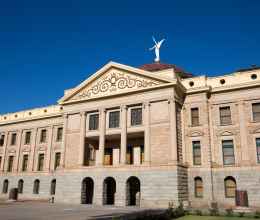
This was orginally published in the Arizona Republic.
The charter school reform bill that passed through a Senate committee last month, Senate Bill 1394, is a good step toward bringing accountability and transparency to hundreds of Arizona charter schools, but it cannot end there.
SB 1394 does not do nearly enough to ensure that Arizona public charter schools are equitable and welcoming to all students.
1. Report civil rights violations
The ACLU of Arizona’s Demand to Learn campaign has heard from many families whose children are being pushed out of the classroom through discriminatory practices. Claims of civil rights violations are often only reported to the offending school, not the charter school’s sponsor.
In Arizona, the sponsor for the vast majority of charter schools is the Arizona State Charter Board. Rather than placing the burden on parents, SB 1394 should be explicit in requiring charter schools to report substantiated civil rights violations to their sponsor. Sponsors must then share that information publicly so state officials can hold repeat offenders accountable.
2. Collect data when students leave
Another missing piece in SB 1394 is the matter of data — or, rather, the lack thereof. Currently, charter schools do not report data on student mobility. This information is crucial. It tells us when a student leaves the school and why.
Without knowing a charter school’s enrollment numbers or the number of suspensions, expulsions and withdrawals, the public cannot determine whether a school is properly serving its community or engaging in unlawful or exclusionary practices. SB 1394 should mandate that charter school operators report this key data to the public.
3. Fill boards with independent members
State Sen. Kate Brophy McGee, an influential Republican in the GOP-controlled Legislature, discuss a series of charter school reforms she is pushing. Nick Oza, The Republic | azcentral.com
Supporters of SB 1394 are also praising its proposed requirements for charter governing boards. But SB 1394 would continue to allow family members, employees and friends of charter school operators to sit on the board, which is hugely problematic.
SB 1394 should instead require governing boards to comprise independent members who would have complete, independent oversight of the academic, financial and operational quality of the school. SB 1394 in its current form does not assure Arizonans that charter school boards are making autonomous decisions — or any decisions at all.
Take Great Hearts Academies, for example. The “governing boards” for the 22 Arizona Great Hearts schools do not hold any decision-making authority. These sham boards, composed of employees and friends of the charter management group, are used to shield the charter operator, the entity that’s really making school policy, from public scrutiny.
This lack of transparency led to the implementation of Great Hearts’ anti-transgender policy and discriminatory grooming policy. In both cases, the policies were implemented behind closed doors and without school, parent or community input.
Public charter schools can't operate secretly
Public, taxpayer-funded charter schools should not be allowed to operate in secrecy. SB 1394 allows schools like Great Hearts to continue to do so. SB 1394 should require charter operators to abide by public records and open meetings law for decisions that impact the management and operations of charter schools.
Without this, Arizona families will continue to be cut off from crucial school policy conversations that can impact thousands of students.
The ACLU of Arizona’s Demand to Learn campaign seeks equitable charter schools that reflect and serve our communities. We applaud the efforts being made to bring much needed accountability to our public schools but for the sake of Arizona students, it must not end with SB 1394.
We must bring teachers, students and parents to the table and work together to address the inequality plaguing Arizona charter schools.
Anabel Maldonado manages Demand to Learn, an ACLU of Arizona campaign aimed at eliminating practices that push children out of the classroom or prevent them from enrolling. Reach her at Amaldonado@acluaz.org; on Twitter: @anabel_arizona.



